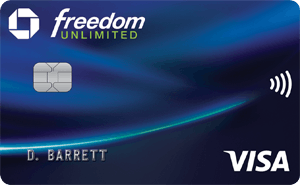This offer is no longer available on our site: Chase Freedom Flex®
Chase Freedom Unlimited® review: Worth a look for most consumers
Editors’ Take: With a mix of useful bonus categories and a solid rewards rate on all other purchases, Chase Freedom Unlimited® offers considerable potential value without requiring too much effort.

Great for maximizing cash back

Annual Fee: $0
The average credit score for members who have matched with this card or similar cards is 699
The average credit limit for members who have matched with this card or similar cards is $6,911
Explore more about this card:
Here’s the average credit limit of members who matched their Chase Freedom Unlimited® or similar cards.
% of members by credit limit range
The average credit limit for members who have matched with this card or similar cards is $6,911, with $500 being the most common.

Here’s the average credit score of members who matched their Chase Freedom Unlimited® or similar cards.
% of members by credit score range
The average credit score for members who have matched with this card or similar cards is 699, with 810 being the most common. Note this is just one of the deciding factors when it comes to getting approved.

This content is curated by Intuit Credit Karma’s Editorial team using data from members who were approved for this card or similar cards, or who self-matched this card or similar cards. Intuit Credit Karma receives compensation from third-party advertisers, but that doesn’t affect our editors’ opinions. Our third-party advertisers don’t review, approve or endorse this content. Information about financial products not offered on Credit Karma is collected independently. Our content is accurate to the best of our knowledge when posted.
Member stats
Updated daily

32%
Average credit utilization (or what percent of the card’s credit limit is being used) of members who matched with this card or similar cards.

45 years
Average age of members who matched this card or similar cards.

$93,590
Average annual income of members who matched this card or similar cards. Note: Income may be estimated for some members by Credit Karma and may differ from members’ actual incomes.
Pros and cons
 Image: yes
Image: yesBonus categories offer the chance to maximize value
 Image: yes
Image: yesGood rate on all other purchases allows for straightforward earning
 Image: yes
Image: yesNo annual fee to eat into rewards value
 Image: Con
Image: ConForeign transaction fee could cost travelers
 Image: Con
Image: ConLacks long-term value in some bonus categories
Chase Freedom Unlimited® review
Updated December 2, 2025
This date may not reflect recent changes in individual terms.
Written by: Eric Freeman
3 things to know about the Chase Freedom Unlimited®
Editors’ Take: With a mix of useful bonus categories and a solid rewards rate on all other purchases, Chase Freedom Unlimited® offers considerable potential value without requiring too much effort.
1. Numerous ways to earn bonus rewards
The Chase Freedom Unlimited® has previously been a straightforward cash back credit card offering 1.5% back in rewards on all purchases. Now, though, it holds considerably more potential.
Cardholders can now also earn 5% back on travel purchased through Chase, 3% back on dining and 3% back on drugstore purchases. Plus, Chase still offers the same 1.5% back on all other purchases.
In other words, the Chase Freedom Unlimited® card added bonus rewards in several common spending categories without dropping the 1.5% rate that made it a recommended card in the past.
2. No annual fee
Like many of the best cash back credit cards, the Chase Freedom Unlimited® doesn’t charge an annual fee — so you don’t have that extra cost taking a bite out of the cash back you can earn.
3. Low intro APR on purchases and balance transfers
The Chase Freedom Unlimited® features an introductory 0% APR on purchases and balance transfers for the first 15 months after opening the account. After that, the APR for purchases and balance transfers climbs to a variable 18.24% - 27.74%. There’s a balance transfer fee: Either $5 or 3% of the amount of each transfer, whichever is greater in the first 60 days. 5% (minimum $5) thereafter.
This offer can help you cover any big or unexpected expenses, but keep in mind that unpaid balances remaining after the expiration of the intro period will accrue interest. Those interest payments will eat into the value of any rewards you earn from your purchases.
Other things to consider with the Chase Freedom Unlimited®
Here are a couple of other card features to keep in mind.
- You could earn up to $500 in referral bonuses. You’ll earn $50 cash back for every person you refer who is approved for the card.
- The Chase Freedom Unlimited® might not be the best credit card to bring on your next international trip because it charges a 3% foreign transaction fee.
Understanding your points and redemption options
The points you earn from the Chase Freedom Unlimited® are worth 1 cent each.
The simplest way to redeem your points is through Chase Ultimate Rewards for cash back, travel or gift cards. You can also use them to pay for purchases you make on Amazon.com.
You can learn more about how this process works and other rewards options in our guide to the Chase Ultimate Rewards program.
Who this card is good for
The bonus categories and 1.5% rewards rate on most purchases with the Chase Freedom Unlimited® make it one of the best cash back cards on the market for many different kinds of consumers.
While not everyone will get the same value out of the bonus rewards rates on travel and dining, the 1.5% rate on most purchases is comparable to that of several notable flat-rate cash back cards that don’t include any bonus categories.
Cardholders who like to maximize rewards value across a number of cards may need to look elsewhere for long-term value on categories like groceries, but the Chase Freedom Unlimited® is worth a look for anyone who wants to maximize cash back value without putting in too much effort.
Not sure this card is right for you? Consider these alternatives.
If you’re not sold on the Chase Freedom Unlimited®, you might be interested in one of these other cash back credit cards.
- Chase Freedom Flex®: This card offers similar bonus categories with a bit more variety in cash back opportunities.
- Citi Double Cash® Card: If you don’t want to consider too many bonus categories, this card’s rewards might appeal to you more.
- Capital One Savor Cash Rewards Credit Card: This card features ongoing value from both groceries and dining purchases.
Member reviews
Most helpful positive review
—
Most helpful negative review
—


